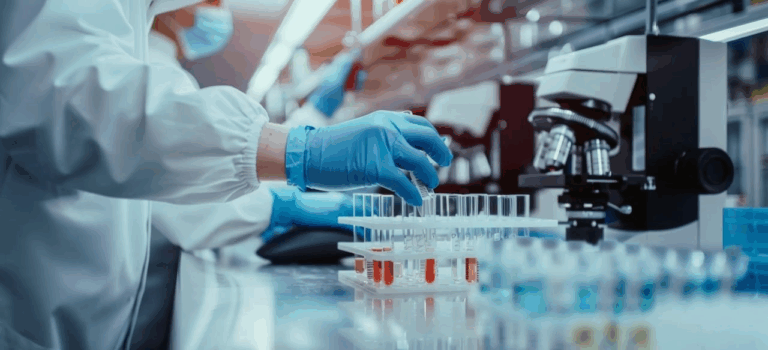Medical research is the backbone of modern healthcare. It’s the field that brings groundbreaking treatments, life-saving medications, and innovative solutions to global health challenges.
If you are truly passionate about science and discovery, a career in medical research offers the opportunity to make a profound impact on people’s lives; while fulfilling your own aspirations. Let’s take a closer look at the key roles in medical research, their importance, and how you can contribute to advancing healthcare.
Why Medical Research Matters
Medical research is a field that opens doors to countless industries. From pharmaceutical applications all the way to biotechnology and public health. From developing vaccines to combating diseases like cancer and diabetes, medical research drives progress in healthcare—especially now as AI is also making its way into the field.
According to the World Health Organization, research has directly contributed to increasing life expectancy and improving the quality of life globally. Additionally, medical breakthroughs combat epidemics, address chronic conditions, and prepare healthcare systems for emerging threats.
Medical research also influences public health policies, ensuring that healthcare systems are equipped to handle current and emerging challenges. Whether it’s responding to pandemics or addressing chronic conditions, research lays the foundation for informed decision-making and innovation.
Key Roles in Medical Research
Careers in medical research span various specializations, from laboratory-based roles to clinical applications. Below are some of the critical positions in this dynamic field:
1. Clinical Research Associate (CRA)
Clinical research associates manage and monitor clinical trials that evaluate new treatments or drugs. They ensure compliance with regulations, monitor participant safety, and assess the integrity of collected data.
Responsibilities:
- Overseeing trial protocols and ethics compliance.
- Coordinating with research sites, hospitals, and sponsors.
- Reviewing trial data for accuracy and adherence to guidelines.
CRAs are the primary driving force behind bringing innovative drugs and therapies to market, ensuring they meet regulatory and safety standards.
2. Biostatistician
Biostatisticians analyze data from research studies to identify patterns, validate results, and draw meaningful conclusions. They play a vital role in designing studies that yield reliable and actionable outcomes.
Responsibilities:
- Developing statistical models for clinical trial design.
- Analyzing datasets to ensure validity and reliability.
- Collaborating with researchers to interpret results.
Without statistical data analysis, medical studies risk delivering inconclusive or misleading findings, delaying advancements in healthcare. Furthermore, it gives rise to compliance issues, which can further delay product launches.
3. Medical Laboratory Scientist
Medical laboratory scientists conduct experiments to uncover mechanisms of disease, test hypotheses, and validate new treatments. They use several techniques like PCR, flow cytometry, and gene editing for this, among others.
Responsibilities:
- Designing and performing laboratory experiments.
- Maintaining meticulous documentation of procedures and findings.
- Testing samples for drug efficacy and safety.
Their work informs the development of treatments and diagnostics, offering the foundation for clinical applications.
4. Regulatory Affairs Specialist
Regulatory affairs specialists navigate the complex world of healthcare regulations, ensuring that new treatments meet compliance standards in various markets.
Responsibilities:
- Preparing submissions for regulatory approval, such as FDA or EMA applications.
- Monitoring changes in regulations affecting the industry.
- Collaborating with researchers to align studies with compliance requirements.
Delays in regulatory approval can cost millions of dollars and hinder patient access to life-saving treatments. As a result, this is a high-paying job that comes with a number of different perks.
5. Epidemiologist
Epidemiologists study disease patterns, causes, and effects on populations. Their insights inform public health strategies and policy decisions, especially during pandemics.
Responsibilities:
- Collecting and analyzing data on disease outbreaks.
- Identifying risk factors and intervention strategies.
- Advising policymakers on disease prevention and control.
Their expertise is necessary for managing health crises, from infectious disease outbreaks to chronic condition prevalence.
6. Biostatisticians
Biostatisticians are the backbone of data analysis and interpretation from medical studies. Their expertise ensures that research findings are statistically valid and reliable. They design experiments, evaluate outcomes, and contribute to evidence-based conclusions.
A career in biostatistics requires a strong foundation in mathematics and statistics, often supported by a degree in biostatistics or epidemiology. Precision and analytical thinking are key traits for success in this field; something that’s valued highly in this role.
The Path to a Career in Medical Research
Starting a career in medical research often requires formal education and training. Undergraduate degrees in biology, chemistry, or biomedical sciences lay the groundwork for advanced studies. Internships, research assistant roles, and lab experiences are invaluable for building practical skills and connections in the field.
If you are aiming to specialize, graduate programs offer opportunities to go deeper into specific areas of interest. Networking with professionals and staying updated on industry advancements can open doors to rewarding positions in research institutions, universities, and healthcare organizations. However, there are certain challenges as well. One of the most pressing ones herein is that funding can be quite competitive, and research timelines are often long.
Connect Talent to Opportunities with Mediafire Jobs
Ready to make your mark in medical research? Mediafire Jobs is your go-to platform for discovering medical jobs California professionals are pursuing today. Whether you’re looking into lab technician jobs California offers or seeking roles in research institutions, pharmaceutical companies, academic settings, and more. Let us connect you to positions where you can drive innovation and impact healthcare!


